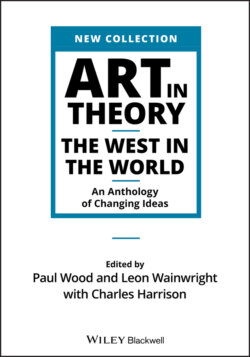Читать книгу Art in Theory - Группа авторов - Страница 133
IIB12 Erasmus Darwin (1731–1802) On revolution, slavery and the Wedgwood medallion
ОглавлениеThe elevated language of Erasmus Darwin’s Augustan verse has been left beached by a modern sensibility rooted in Romanticism. Nonetheless, at the time his efforts marked an attempt to modernize poetry and have it address pressing contemporary issues, both technological and social. The present short selection links the two. Darwin has just been praising Benjamin Franklin for his work on electricity and Josiah Wedgwood for his establishment of the Etruria ceramic works at Stoke‐on‐Trent. He moves on to an invocation of the spirit of the French Revolution. Pursuing his theme of freedom, he then turns to a denunciation of Catholic Spain for its colonization and enslavement of South America and begs ‘Britannia’ to take a different course with the Atlantic slave trade. His reference in the closing lines is to the Wedgwood anti‐slavery medallion, in which a kneeling African figure in chains is surrounded by the legend ‘Am I not a man and a brother’. This medallion, after the model of an antique cameo, was first produced in 1787 for the Committee for the Abolition of the Slave Trade. Although subsequently criticized for its paternalism, the Wedgwood medallion made a significant contribution to the anti‐slavery movement in late eighteenth‐century Britain. The extract is taken from The Botanic Garden, Part I The Economy of Vegetation, London, 1791, pp. 92–3 and 95–6 (lines 377–94 and 413–30).
‘Long had the Giant‐form on GALLIA’s plains
Inglorious slept, unconscious of his chains;
Round his large limbs were wound a thousand strings
By the weak hands of Confessors and Kings;
O’er his closed eyes a triple veil was bound,
And steely rivets lock’d him to the ground;
While stern Bastile with iron cage inthralls
His folded limbs, and hems in marble walls.
− Touch’d by the patriot‐flame, he rent amazed
The flimsy bonds, and round and round him gazed;
Starts up from earth, above the admiring throng
Lifts his Colossal form, and towers along;
High o’er his foes his hundred arms He rears,
Plowshares his swords, and pruning hooks his spears;
Calls to the Good and Brave with voice, that rolls
Like Heaven’s own thunder round the echoing poles;
Gives to the winds his banner broad unfurl’d,
And gathers in its shade the living world!
* * *
‘Heavens! on my sight what sanguine colours blaze!
Spain’s deathless shame! the crimes of modern days!
When Avarice, shrouded in Religion’s robe,
Sail’d to the West, and slaughter’d half the globe;
While Superstition, stalking by his side,
Mock’d the loud groans, and lap’d the bloody tide;
For sacred truths announced her frenzied dreams,
And turn’d to night the sun’s meridian beams. –
Hear, oh, BRITANNIA! potent Queen of isles,
On whom fair Art, and meek Religion smiles,
Now AFRIC’s coasts thy craftier sons invade
With murder, rapine, theft, − and call it Trade!
− The SLAVE, in chains, on supplicating knee,
Spreads his wide arms, and lifts his eyes to Thee;
With hunger pale, with wounds and toil oppress’d,
“ARE WE NOT BRETHREN?” sorrow choaks the rest; −
− AIR! bear to Heaven upon thy azure flood
Their innocent cries! – EARTH! cover not their blood!’
